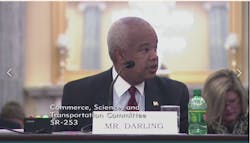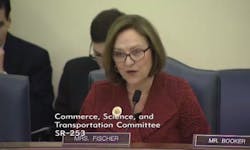FMCSA's Darling knows the law; agency's math is the real issue
As I’m writing this, my computer’s calendar app keeps reminding that Senate Commerce members get together this morning to decide whether to recommend Scott Darling to the full Senate as the next Federal Motor Carrier Safety Administrator. For all practical purposes, this is a done deal—or should be.
Darling has been the boss without the title for a year and a half, and he seems to be respected and even liked within the trucking community—although, in contrast to some of the other DOT modal agency leaders over the years (I’m looking at you, railroads), he can’t be accused of being a friendly insider. And as Darling’s predecessor Anne Ferro showed, an administrator who’s initially criticized for being too cozy with the industry might be a case for being careful what you ask for.
The one thing that could stall Darling’s nomination, ironically, would be his demonstrated record of competence as acting FMCSA chief. As his initial confirmation hearing served to remind, some key Republican senators just don’t like the agency’s programs. And these senators, led by Deb Fischer (R-NE), continue to try to paint FMCSA as a rogue outfit that is unfair to the businesses it oversees and has ignored congressional dictates to shape up.
While some in trucking—and sympathetic members of Congress—accuse FMCSA of relying on “smoke and mirrors” to push forward with its data-based assessment of trucking company safety despite changes called for in the new highway bill, I’d argue that this outrage is more “tempest in a teapot.”
In the nomination hearing, Fischer repeatedly challenged Darling on the proposed revision of to Safety Fitness Determination and carrier ratings, and it was unfair—to Fischer. Face it: A member of Congress, in a live hearing, is only as good as her homework and the ability to think on her feet or, rather, from the transportation subcommittee chair’s chair.
Admittedly, this is a complex matter even for people in trucking; a busy lawmaker shouldn’t be expected to grasp the finer points. Oh, and I did I mention that Darling—before being asked to take the big desk—was FMCSA’s top attorney? Definitely an unfair matchup.
However, the procedure for confirming the President’s nominees allows a two-week window for written questions. In other words, after a senator maybe didn’t quite ask what she or he meant to ask, a staff expert can draft queries with a little more specificity and a bit of legal brio.
And again, Fischer tried to get Darling to concede FMCSA is ignoring Congress. Good luck getting a lawyer to say, in writing, that he broke the law. The full Q&A is here for those who enjoy snappy repartee that opens with phrasing “As prescribed in Section 5221 … .” But the gist is the same as in his oral responses: Darling cites the specific highway bill passage referenced by the questions and says, again, ‘no,’ FMCSA isn’t doing what it’s not supposed to do.
I’m not a lawyer, as we tend to qualify on the internet these days, but I think FMCSA has a case. Still, this is just the sideshow. FMCSA has always intended to use the data to let computers determine if carriers are unfit, but the SFD employs none of peer-group percentiles that Congress has blocked. Simple. For the time being.
The real question is whether that underlying data is accurate and suitable, and the review of that data is at the heart of the regulatory reform mandated by Congress. Until that analysis is complete there’s not much more to be said. But talking in circles is what Senators do. And sitting patiently at the witness table in hearing rooms is what administrators do.
And trucking has to make due.
(About that data: Coming next, we get an update on the update to the FMCSA carrier safety website from Vigillo’s Steve Bryan, whose company has carved out a nice niche in reworking the agency’s numbers in ways that make sense.)
About the Author
Kevin Jones
Editor
Kevin has served as editor-in-chief of Trailer/Body Builders magazine since 2017—just the third editor in the magazine’s 60 years. He is also editorial director for Endeavor Business Media’s Commercial Vehicle group, which includes FleetOwner, Bulk Transporter, Refrigerated Transporter, American Trucker, and Fleet Maintenance magazines and websites.
Working from Beaufort, S.C., Kevin has covered trucking and manufacturing for nearly 20 years. His writing and commentary about the trucking industry and, previously, business and government, has been recognized with numerous state, regional, and national journalism awards.


